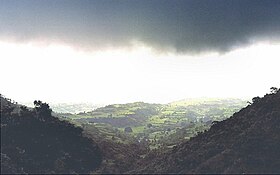Vindhya Hills
| Vindhya | |
|---|---|
| Vindhyachal, Vindhyas | |
 |
|
| Highest point | |
| Peak | (Sadbhawna Shikhar / Kalumar Peak) |
| Elevation | 752 m (2,467 ft) |
| Coordinates | 23°28′0″N 79°44′25″E / 23.46667°N 79.74028°ECoordinates: 23°28′0″N 79°44′25″E / 23.46667°N 79.74028°E |
| Naming | |
| Etymology | "Obstructor" or "Hunter" (Sanskrit) |
| Geography | |
| Country | India |
| States | |
| Borders on | Satpura Range & Chota Nagpur Plateau |
The Vindhya Range (pronounced [ʋɪnd̪ʱjə]) is a complex, discontinuous chain of mountain ridges, hill ranges, highlands and plateau escarpments in west-central India.
Technically, the Vindhyas do not form a single mountain range in the geological sense. The exact extent of the Vindhyas is loosely defined, and historically, the term covered a number of distinct hill systems in central India, including the one that is now known as the Satpura Range. Today, the term principally refers to the escarpment that runs north of and roughly parallel to the Narmada River in Madhya Pradesh, and its hilly extensions. Depending on the definition, the range extends up to Gujarat in the west, Uttar Pradesh in the north and Chhattisgarh and Bihar in the east.
The Vindhyas have a great significance in Indian mythology and history. Several ancient texts mention the Vindhyas as the southern boundary of the Āryāvarta, the territory of the ancient Indo-Aryan peoples. Although today Indo-Aryan languages are spoken to south of the Vindhyas, the range continues to be considered as the traditional boundary between north and south India. The former Vindhya Pradesh was named after the Vindhya Range.
According to the author of a commentary on Amarakosha, the word Vindhya derives from the Sanskrit word vaindh (to obstruct). A mythological story (see below) states that the Vindhyas once obstructed the path of the sun, resulting in this name. Ramayana from Valmiki states that the great mountain Vindhya that was growing incessantly and obstructing the path of the Sun stopped growing any more in obedience to Agastya's words. According to another theory, the name "Vindhya" means "hunter" in Sanskrit, and may refer to the tribal hunter-gatherers inhabiting the region.
...
Wikipedia

